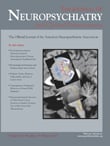Delusional Parasitosis as a Presenting Feature of Dementia
To the Editor: Delusional parasitosis is a rare condition characterized by delusions of infestation by insects or worms. It may occur alone or in association with other psychiatric or neurological conditions, such as dementia. Delusions of parasitosis/infestation are rather infrequent in patients with dementia 1 and are even more uncommon as a presenting symptom of dementia. This case illustrates the latter scenario.
Case Report
A 78-year-old African-American woman first presented to the emergency department with a year’s history of the perception that something was crawling inside her abdomen and rectum. The patient started having this sensation after she was admitted to a hospital for a foot ulcer. While lying on the hospital bed, she felt that something had crawled up her rectum. The patient believed that her abdomen was infested by a parasite, which was eating her insides. The crawling sensation in her rectum was so intense that the patient would sometimes do digital exploration. The patient became upset about these symptoms and went to the emergency department; she was referred to psychiatry after an unremarkable physical examination, including a rectal examination. She did not have any history of drug and alcohol use, and her past psychiatric and family history was unremarkable. There were no symptoms to suggest a mood disorder or delirium. The patient’s head CT scan showed cerebral atrophy and small vessel ischemic changes. Laboratory investigations, including CBC, liver and renal function tests, TSH, B 12 , folic acid, and urine analysis, were normal. During the psychiatric evaluation, it was evident that the patient had delusions of parasitosis (somatic delusions) and tactile hallucinations. The patient denied auditory or visual hallucinations or other types of delusions. In addition, she endorsed forgetfulness and scored 6/30 on the Montreal Cognitive Assessment. She had deficits in visuospatial/executive functions, verbal fluency, abstraction, and delayed recall. She was oriented to time, place, and person but not to date, month, or year. The patient’s family corroborated the decline in the patient’s memory, trouble finishing sentences, and declining ability to carry out activities of daily living. The patient was diagnosed with dementia of Alzheimer’s type and psychotic disorder secondary to Alzheimer’s disease according to the DSM-IV-TR. The patient was started on a regimen of risperidone, 0.5 mg/day, and donepezil, 5 mg/day. The dose of risperidone was increased to 2 mg/day over a month, with complete resolution of the patient’s somatic delusions and tactile hallucinations.
Discussion
Delusional parasitosis in elderly patients has been described in primary care, psychiatric, and dermatology practice. 2 , 3 In a case series of 10 patients from a psychiatric clinic, two patients had dementia. 3 Delusional parasitosis as a presenting symptom of dementia remains underdiagnosed and has been described only in a handful of case reports. In one such case, an 85-year-old woman was symptomatic for 2 years and was seen by two dermatologists before being diagnosed with delusional parasitosis. She scored 8/30 on the Mini-Mental State Examination (MMSE) at the time of diagnosis, suggestive of dementia. 4 Another report described an 82-year-old woman who initially presented with delusions of insects crawling on her skin and scored 18/34 on Hodkinson’s Mental Test. 5 The patient was diagnosed as having delusional infestation with a possible dementing illness.
Of interest, in our case and in the above two cases, the patients were elderly women, which is the demographic group usually afflicted with delusional parasitosis. 2 Thus, clinicians should explore for underlying dementia in older women presenting with delusions of infestation. Delusional patients with dementia perform worse on cognitive testing compared with patients without delusions, with greater frontal lobe and executive deficits, 6 as was also the case with our patient. However, these functions are not adequately captured by the commonly used MMSE, and more comprehensive cognitive testing in such cases is recommended.
1. Harvey RJ: Review: delusions in dementia. Age Ageing 1996; 25:405–408Google Scholar
2. Le L, Gonski PN: Delusional parasitosis mimicking cutaneous infestation in elderly patients. Med J Aust 2003; 179:209–210Google Scholar
3. Nicolato R, Corrêa H, Romano-Silva MA, et al: Delusional parasitosis or Ekbom syndrome: a case series. Gen Hosp Psychiatry 2006; 28:85–87Google Scholar
4. Takahashi PY, Krahn L: Case report: delusions of parasitosis as unusual presenting feature of dementia. Annals of Long-Term Care 1999; 7:153–155Google Scholar
5. Renvoize EB, Kent J, Klar HM: Delusional infestation and dementia: a case report. Br J Psychiatry 1987; 150:403–405Google Scholar
6. Schneider LS, Dagerman KS: Psychosis of Alzheimer’s disease: clinical characteristics and history. J Psychiatr Res 2004; 34:105–111Google Scholar



